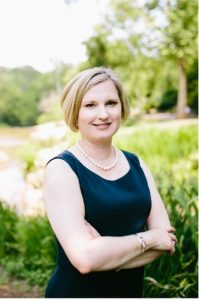ECE Distinguished Lecture – Dr. Julie P. Martin – Why Decades of Broadening Participation in Engineering Education Have Gotten it Wrong (and what we can do about it)
August 23, 2021
ECE Distinguished Lecture
September 03, 2021 at 2pm (Virtual Event*)
Why Decades of Broadening Participation in Engineering Education Have Gotten it Wrong (and what we can do about it)
Julie P. Martin
Associate Professor and
Associate Department Chair for Graduate Programs & Research Infrastructure
The Ohio State University
Editor-in-Chief, Journal of Women & Minorities in Science & Engineering
 Abstract: We know that diverse teams create better solutions, and yet four decades of broadening participation efforts in engineering higher education have failed to produce the diversity of talent needed to address today’s complex challenges. One reason for this is the deficit-minded thinking that underlies much educational research and practice. Deficit thinking is what we colloquially might call a “fix-the-student” mentality. Deficit thinking is person-centered in that it blames students, their families, communities, or their culture for their underperformance while holding educational institutions, faculty, inequitable policies and practices faultless. Most recruitment and retention programs for underrepresented engineering students are inadvertently deficit-oriented, focusing on individual students and interventions to fix their perceived deficits through activities such as tutoring, advising, or mentoring. The problem with this approach is that it implies that when we simply support individual students, the issue underlying their underrepresentation will be solved. In fact, when we assist individual students, the inequitable structures that necessitate their support remain uncontested.
Abstract: We know that diverse teams create better solutions, and yet four decades of broadening participation efforts in engineering higher education have failed to produce the diversity of talent needed to address today’s complex challenges. One reason for this is the deficit-minded thinking that underlies much educational research and practice. Deficit thinking is what we colloquially might call a “fix-the-student” mentality. Deficit thinking is person-centered in that it blames students, their families, communities, or their culture for their underperformance while holding educational institutions, faculty, inequitable policies and practices faultless. Most recruitment and retention programs for underrepresented engineering students are inadvertently deficit-oriented, focusing on individual students and interventions to fix their perceived deficits through activities such as tutoring, advising, or mentoring. The problem with this approach is that it implies that when we simply support individual students, the issue underlying their underrepresentation will be solved. In fact, when we assist individual students, the inequitable structures that necessitate their support remain uncontested.
Likewise, the vast majority of published research on underrepresentation in engineering education is either explicitly or implicitly deficit-based. Research often focuses on why underrepresented students underperform or leave the field. We know less about why underrepresented students succeed in the field.
Research and interventions that challenge the status quo are necessary in order to address systemic inequities. We simultaneously need to dismantle deficit thinking by employing asset-based approaches that recognize the multiple domains of students’ lives. This shift will not be easy as it necessitates deconstructing practices, beliefs, and policies.
During this interactive talk, we will: (1) explore the idea of deficit thinking in engineering education (2) learn about asset-based frameworks such as community cultural wealth (3) think about how we can begin to transform our educational systems through asset-based approaches to student success and a focus on institutional change. Come ready to participate!
Biographical info: Dr. Julie P. Martin is the Associate Department Chair for Graduate Studies and Research Infrastructure in the Department of Engineering Education at The Ohio State University. She a Fellow of the American Society for Engineering Education (ASEE) and the editor-in-chief of the Journal of Women and Minorities in Science and Engineering. Dr. Martin’s research agenda focuses on diversity, equity, and inclusion in engineering education.
Prior to joining the faculty at OSU in 2019, Dr. Martin was a program director Engineering Education and Centers Division (Directorate for Engineering) at the National Science Foundation (NSF). While at NSF, she managed the Engineering Education portfolio which includes $2M Revolutionizing Engineering Department (RED) grants supporting teams that serve as national exemplars of organizational culture change. In 2018, she worked on an interagency group headed by the White House Office of Science and Technology Policy to write the 5-Year STEM Education Strategic Plan for the federal government. She has held faculty appointments at Clemson University, Virginia Tech, and University of Houston, where she was the Director of Recruitment and Retention for the Cullen College of Engineering.
Over the last 15+ years, Dr. Martin has held a variety of national leadership positions in ASEE and Women in Engineering ProActive Network (WEPAN), including national president of WEPAN. She has been recognized by both organizations for her distinguished service. She holds a BS in Materials Science and Engineering from North Carolina State university and a PhD in the same field from Virginia Tech.
*For further information, contact Samee U. Khan | skhan@ece.msstate.edu | 662.325.0167
 For Webex Information, Scan the QR Code
For Webex Information, Scan the QR Code
The Department of Electrical and Computer Engineering at Mississippi State University consists of 23 faculty members (including 7 endowed professors), 3 clinical faculty, 10 professional and support staff, and over 700 undergraduate and graduate students with approximately 88 being at the Ph.D. level. With research expenditure of the department in excess of $10M, the department houses the largest High Voltage Laboratory among North American Universities. For more detailed information on the department please visit our website www.ece.msstate.edu.
